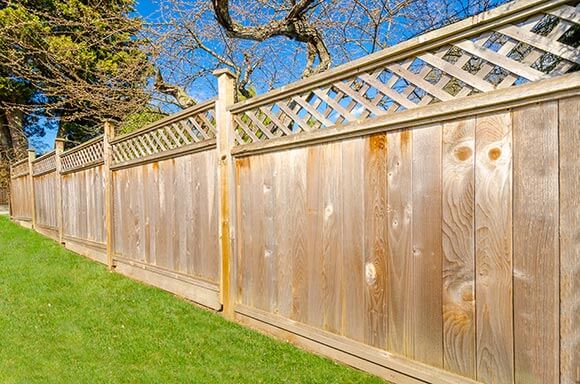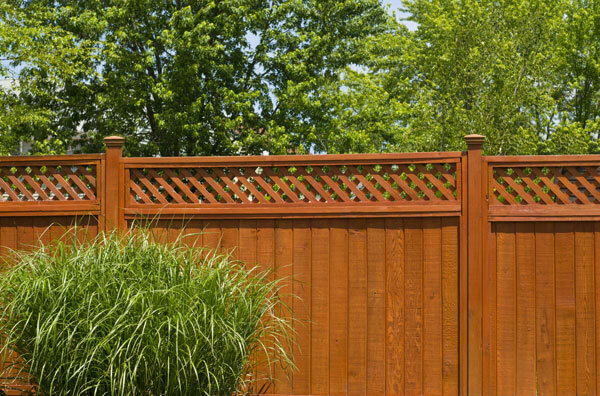Using an oil-based fence treatment is a great way to protect fence panels and posts from the effects of weathering. Fence oils not only keep garden fences looking better for longer, they nourish and feed the wood to keep it supple and water resistant. This helps to prevent fence panels from drying out, which in turn helps to prevent fence panels from shrinkage, cracking, splitting, and warping.

Preserving then oiling a garden fence provides excellent weatherproof protection
Why oil garden fence panels and posts?
Any garden wood exposed to weathering and sunlight will eventually lose its natural oils. This applies to garden sheds, fences and decking. When this happens, timbers become vulnerable to cracking, splitting, warping, and shrinkage as well as water ingress, mould, algae, and wood rot.
Which wood oil can be used on fence panels?
There are a variety of clear and coloured exterior wood oils that can be used to protect garden fences. Which one largely depends on personal preference for a clear or coloured finish. Some oils contains UV filters, biocides and/or fungicides to help combat mould, algae and other biological threats.
Top 5 exterior wood oils suitable for garden fences
- Barrettine Log Cabin Treatment: A clear exterior wood oil specially formulated for log cabins, decking and other garden wood. Can be used on tanalised or bare wood fence panels, new and old. Provides excellent weather protection and keeps fence timbers nourished and supple.
- Timbashield Wood Stain: A versatile, solvent-based wood stain suitable for garden fences, sheds, and more. Available in clear and a range of attractive colours. Made from a blend of oils, resins and waxes and can be applied by brushing, spraying, or with a roller. Creates a water-repellent, UV resistant finish on wooden fences and sheds. Dries to a deeper colour on softwoods and a lighter colour on hardwood fences, sheds and other garden wood.
- Osmo UV Protection Oil Extra: A clear or coloured UV resistant wood oil that is suitable for all vertical wood surfaces, including wooden fences, that require good protection from the suns UV rays. Available in clear and a range of colours.
- Creocote – Creosote substitute: An oil-based ‘Creosote’ substitute for exterior wood, including garden fences and sheds. Available in light and dark shades of brown. More environmentally and user friendly than traditional Creosote which can no longer be sold to the public.
- Osmo Country Colour: An extremely weather and UV-resistant, premium grade, opaque, coloured wood oil for long term protection. Ideal for garden fences and other garden wood where a strong, opaque, decorative colour is desired
Fence oils with UV filters
Fence panels and posts that are exposed to a lot of direct sun light will naturally turn grey or silver faster than those that are not. UV resistant wood oils, like suntan creams, will significantly slow this process. They don’t however stop it.
Clear or coloured fence oil?

Coloured decking oils are a great way to stain and protect fences
Deciding on whether to use a clear or coloured wood oil may depend on the age, colour and condition of the fence.
- To preserve the colour of new fence panels, treat with a clear wood oil that contains UV filters
- To allow wood panels to turn grey / silver, use a clear wood oil that doesn’t contain UV filters
- To stain fence panels treat with a coloured wood preservative then a clear wood oil
- Alternatively, use a clear fence preserver then a coloured wood oil or decking oil
Choosing an opaque or translucent fence finish
For most, keeping the appearance of the wood grain is important, that’s why most coloured exterior wood oils provide a translucent wood finish where the detail and pattern of the wood grain is still clearly visible. There are however a few products that give an opaque finish, these are generally used on smooth planed fences such as picket fences to give a paint like finish. The beauty of an opaque wood oil is that although it looks like a paint, it will never crack, flake or peel off. An example of this is the excellent Osmo Country Colour.
Can decking oil be used on fence panels and posts?
In a word ‘Yes’. Decking oils are perfect for fence panels and posts as they are designed to be durable and weather resistant. As with decking, they will keep fence panels nourished and water repellent, therefore preventing cracking, warping, and splitting. Available in both clear and a wide range of colour variations, with or without UV filters, decking oils are perfect for staining and protecting new and old garden fences.
Coloured decking oils suitable for garden fences
The following decking oils are suitable for use on fence panels and posts and are available in both clear and coloured formulations.
- Ronseal Decking Oil: A long established and proven decking treatment that offers excellent value for money and available in a range of attractive, tinted, colour shades. Ideal for any exterior wood including wooden fences and posts
- Manns Premier UV Decking Oil: A multi-purpose exterior wood treatment. Unique UV formula resists the greying effects of the sun. Wide range of popular colour tinted finishes that are ideal for staining and protecting wooden fences
- Barrettine Decking Oil: Available in a range of attractive wood tone colours, this decking treatment can be used to stain and protect any exterior structure including wooden fence panels and more
For a clear, natural finish that provides excellent weather protection, consider Barrettine Log Cabin and Decking Treatment
Creosote – the traditional fence treatment
Those of a certain age will remember when anything wooden in the garden was treated with Creosote. The sale of Creosote is now regulated and can only be sold to farmers and for other industrial uses.
The good news is that there is a safer, more environmentally friendly version called ‘Creocote’. This oil based Creosote substitute is perfect for use on garden fences and sheds and is available in light and dark brown shades.
- Creosote substitute called Creocote: An oil-based Creosote substitute for exterior wood available in light and dark shades
Alternatives to oil-based fence treatments
There are a multitude of fence treatments that will colour and transform new and old garden fences.
Paint for garden fences
The definition of a ‘fence paint’ is very broad as many coloured wood preservers and fence protection treatments are often referred to as ‘paints’. We explain this in greater detail and break down the various paints for garden fences here.
Garden fence stains
garden fence stains can be another area of confusion as this can encompass coloured wood stains, coloured shed and fence preservers, or coloured wood oils as above.
You can find out about fence protective treatments, garden fence care and maintenance, and advice on our garden fence treatments page here.
Top Tip
The final colour of a wood oil on a garden fence is largely affected by the type, age, condition and colour of the wood that makes up the fence panels. If the wooden panels were bought at a different time and from different places, chances are that they will naturally vary in colour to some degree even if they are the same type. Because of this it is important to be aware that even by staining them with a coloured or pigmented wood oil, the end colour may vary from panel to panel and to that shown on the tin. For this reason, always do a test area to assess the colour and final finish before starting on any large scale project.
Garden Fence FAQ’s
Can’t find the answer to your garden fence care or maintenance project above? See our frequently asked garden fence questions and answers page, where we try to answer some of the more commonly asked questions relating to garden fence care, maintenance, and fence treatments.
